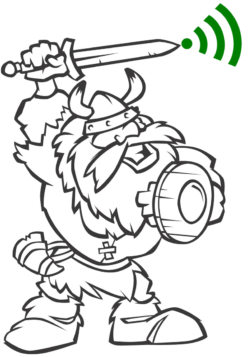With a word as common as Wi-Fi, does anyone stop to think about what that word even means? I did not hear the word until I was out of High School. It took a time before the word caught on. I remember calling the earliest wireless systems the wireless or the wireless network. The technical name for a wireless network, at that time, was IEEE 802.11 Wireless Local Area Network. Quite a mouthful.
The name Wi-Fi was created by Interbrand. Interbrand had been tasked with creating a brand name for the Wireless Ethernet Compatibility Alliance (WECA). The Wireless Ethernet Compatibility Alliance (WECA) was founded in 1999 as a non-profit organization. It had been established to ensure the operation and compatibility of devices created by different manufacturers. The manufacturers could implement the IEEE 802.11 de jure (in law) standard to the letter, but there was no guarantee that the equipment would be interoperable in the real world. Ensuring interoperability based on 802.11 standards is the impetus for the creation of the Wireless Ethernet Compatibility Alliance (WECA) and its family of certifications.
What does Wi-Fi mean? This is where the internet does its magic of telling many different stories, all of which tell a slightly different version of the truth. When I first heard the word Wi-Fi, there was a subconscious connection to the decades-old technology of Hi-Fi. High Fidelity is the name given to home stereo systems that came out in the 1950s and later. These systems were branded as Hi-Fi sets. This differentiated them from the cheap low-quality systems of early times. The term was used to signify the superior audio reproduction, low noise, little distortion and original recording clarity.
The Interbrand website clearly recognizes Hi-Fi as having been an inspiration for the word Wi-Fi. This makes sense to me as the word has a long history of successful branding in the United States. For people younger than a late tricenarian like myself, you might not remember that there was a time when a Hi-Fi set was actually a large piece of furniture proudly displayed in the living room by most families. Fine woodwork would disguise the inner workings of a stereo system and possible turntable. Later sets incorporated an eight-track tape player.
It could very easily be inferred that Wi-Fi stands for Wireless Fidelity. This is where things get contentious. (How appropriate.) There are many articles citing founders claiming that Wi-Fi does not stand for anything. It is just a made up word. This is where I bow out of these types of discussions. How many access points can sit on the head of a pin? All words are made up. Typically they are based on earlier words that are made up from early words. In any event, Wi-Fi is a word and it is here to stay.
After the brand name Wi-Fi was trademarked by WECA and began to see widespread adoption. The organization changed its name to the Wi-Fi Alliance. It continues with this name today. The Wi-Fi Alliance owns the trademark Wi-Fi.
In the common vernacular, Wi-Fi refers to a wireless local area network. It is most commonly used for accessing the internet.
-Do you have Wi-Fi?
-Will there be Wi-Fi when we get there?
-Will we have to pay for Wi-Fi?
-I am using my neighbor’s Wi-Fi.
The one I always love is, “What is your Wi-Fi password?” (Nails on a chalkboard.)
Millennials, I am talking to you. I love the fact that you think access to Wi-Fi is like turning the kitchen sink on for a glass of water. My network is a holy place. I have no idea what you are going to do if I let you have access to my network resources. Do you know what is behind my firewall? The scarier part is that they would just connect to it if I did not have a WPA2 passphrase on it.
Think about how different wireless is from wired due to the open channel and perception of anonymity. Could you imagine a friend or family member coming over and jacking into a switch in my network closet? What authentication do you use for 802.1X? What credentials am I supposed to use?
All kidding aside, the correct question is, “May I please use your Wi-Fi?”
This elucidates the truth that Wi-Fi is a utility in this day and age. It is used to connect people wirelessly to the network resources that their lives have come to revolve around. Wi-Fi is the lifeblood of modern society. Wi-Fi brings freedom to people who are tied into an ever-growing ecosystem of services.
My definition of Wi-Fi reads as follows…
Wi-Fi is wireless technology allowing people to freely move through their environment while maintaining access to resources supplying the needs of mind, body and spirit.
In the end, the technology is irrelevant. It is what Wi-Fi does for humanity that will ultimately sustain the word Wi-Fi well into the future.
